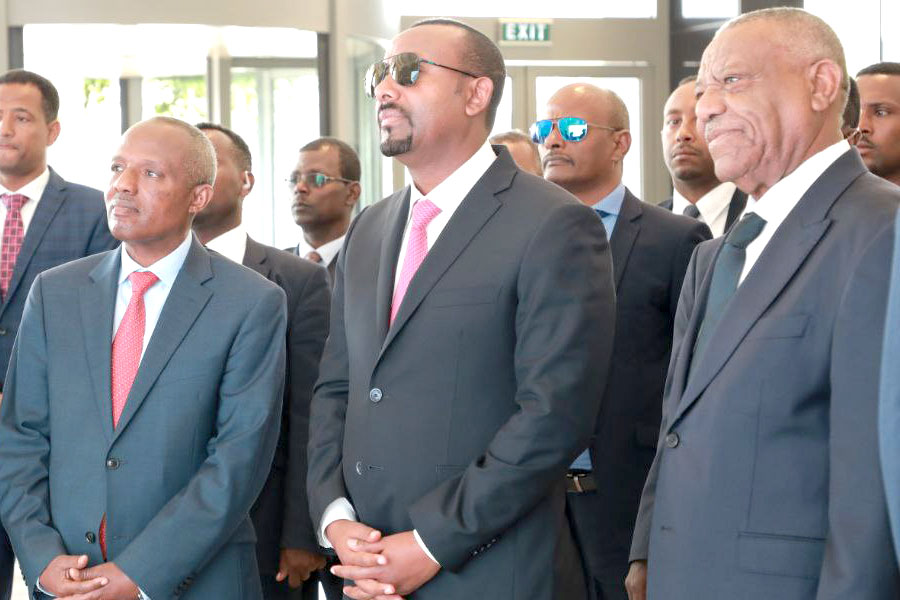
Commentaries | Aug 20,2022
Dec 31 , 2022
By Abeselom Samson
Free trade is expected to bring the continental economy and people together. Member states are expected to put genuine effort into the transformation process by phasing out 90pc of trade tariffs in the coming decade. Beyond its complexity and time-consuming process, each country is expected to adopt tariffs and rules of origin negotiations, writes Abeselom Samson. He is the founder and CEO of Shengo Global and a fellow at the Institute for Economics and Peace (IEP). He can be reached at (samsonabeselom1@gmail.com)
Each year between January and February African heads of state convene in Addis Abeba to endorse policies through a round of discussion. According to Communication Advisor Doreen Apollos, the African Union theme of 2023: The Year of Africa Continental Free Trade Area (AfCFTA) under the "Acceleration of AfCFTA Implementation" will be held in three phases. The summit dates begin with Permanent Representatives' committee meetings then the Executive Council (Ministry of Foreign Affairs). They are expected to be endorsed by the AU head of state assembly on 18 and 19 February 2023.
Last year's theme was focused on trade in line with the Africa Union Agenda 2063 flagship project. The Abuja Treaty ushered free trade on a historic day, 21 March 2018. The established agreement was concluded and signed in Kigali, Rwanda, in the presence of African heads of state and dignitaries. It was an important milestone followed by the operational phase in Niamey, Niger, in July 2019.
Since the AfCFTA free trade is expected to bring the continental economy and people together, the road to realizing the trade is a bumpy one with challenges that need to be addressed sooner than later. Despite the sense of urgency and aspiration being the center of attention, African leaders must walk the talk by promoting and investing in infrastructures to make the continent ready for business. At the same time, regional blocs and agreements must be prepared to break the entrenched protectionism for the free movement of people. A collective vision of a single economy is not a luxury for a continent more significant than the US, and China.
It could get challenging for some member states, but they are expected to phase out 90pc of trade tariffs in the coming decade. Beyond its complexity and time-consuming process, each country is expected to adopt tariffs and rules of origin negotiations.
Data shows that the intra-trade among the countries does not exceed 20pc. According to the 2021 UN COMTRADE database, the trade balance between Ethiopia and Kenya indicates that Ethiopia exported 15.29 million dollars worth of goods to Kenya, while Kenya exported 11 million dollars value of goods to Ethiopia in the same year. But Ethiopia has traded 243 million dollars worth of services and products with Germany and the Netherlands, and Saudi Arabia with 229 and 215 million dollars worth of products and services, respectively.
Endeavoring towards advancing the transformation of the agricultural sector could be enhanced by facilitating the use of modern inputs and technologies. The free trade possibilities with broader and deeper economic integration would attract investment and boost intra-trade and employability. It would also reduce poverty and provide a great leap forward for Agenda 2063 shared prosperity of Africa.
The implementation benefits a single market for goods and service trading among the countries. It needs rigorous measures and commitment to implement protocols that eliminate trade barriers and cooperate with member states on investment and competition policies. Operationalising AfCFTA is a hope, especially for women, in doing business. Successful implementation is crucial for the market to start its journey.
Regional free trade needs a lot of strategic thinking, planning, and skills to implement, monitor, and evaluate processes. By establishing a 1.27 billion dollar market, we can defragment Africa to put behind small, uncompetitive markets and achieve inclusive, sustainable development for the benefit of its people.
AfCFTA has the potential to unlock the continent's potential and is a game changer that is part of pan-African thinking driven by its own people for an integrated, prosperous, and peaceful Africa.
PUBLISHED ON
Dec 31,2022 [ VOL
23 , NO
1183]


Viewpoints | Jan 28,2023

Fortune News | Mar 26,2022

Editorial | Jun 22,2024

Featured | Sep 27,2020

Fortune News | May 06,2023

My Opinion | 131819 Views | Aug 14,2021

My Opinion | 128203 Views | Aug 21,2021

My Opinion | 126147 Views | Sep 10,2021

My Opinion | 123767 Views | Aug 07,2021

Dec 22 , 2024 . By TIZITA SHEWAFERAW
Charged with transforming colossal state-owned enterprises into modern and competitiv...

Aug 18 , 2024 . By AKSAH ITALO
Although predictable Yonas Zerihun's job in the ride-hailing service is not immune to...

Jul 28 , 2024 . By TIZITA SHEWAFERAW
Unhabitual, perhaps too many, Samuel Gebreyohannes, 38, used to occasionally enjoy a couple of beers at breakfast. However, he recently swit...

Jul 13 , 2024 . By AKSAH ITALO
Investors who rely on tractors, trucks, and field vehicles for commuting, transporting commodities, and f...

Jul 5 , 2025
Six years ago, Ethiopia was the darling of international liberal commentators. A year...

Jun 28 , 2025
Meseret Damtie, the assertive auditor general, has never been shy about naming names...

Jun 21 , 2025
A well-worn adage says, “Budget is not destiny, but it is direction.” Examining t...

Jun 14 , 2025
Yet again, the Horn of Africa is bracing for trouble. A region already frayed by wars...

Jul 6 , 2025 . By BEZAWIT HULUAGER
The federal legislature gave Prime Minister Abiy Ahmed (PhD) what he wanted: a 1.9 tr...

Jul 6 , 2025 . By YITBAREK GETACHEW
In a city rising skyward at breakneck speed, a reckoning has arrived. Authorities in...

Jul 6 , 2025 . By NAHOM AYELE
A landmark directive from the Ministry of Finance signals a paradigm shift in the cou...

Jul 6 , 2025 . By NAHOM AYELE
Awash Bank has announced plans to establish a dedicated investment banking subsidiary...